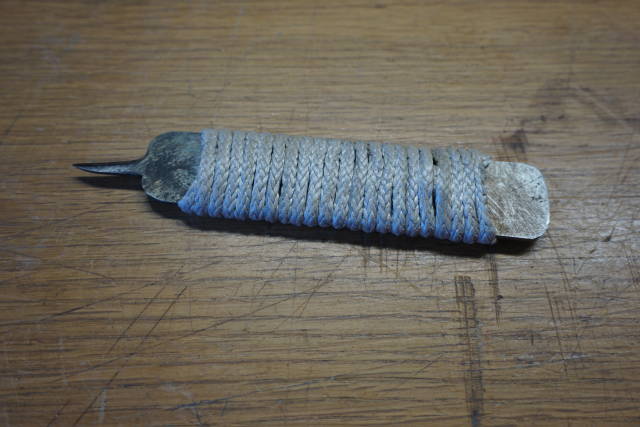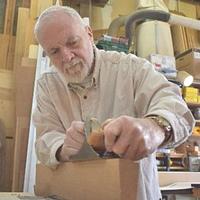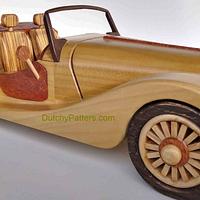
Madts
in almost 12 years
Making a knife sharp again.

I made this knife some time ago from a HHS. saw blade. This little knife has never performed. I just could not get it sharp. After reading up on it I found the solution.
I took the rope off of it and heated up the business end of it too a bright red glow with my mapp torch. When red I dumped the red end into a small bowl of linseed oil. Lots of smoke like in a Harry Potter movie.
Now it will sharpen and is about the keenest tool in my collection.
— Madts.
Tor and Odin are the greatest of gods.
14 Comments
Is there anything special about using linseed oil? Wouldn’t water do the same trick (hardening) or does the oil add something to the steel?
Losing fingers since 1969
Brian; I have no idea. Everybody said use oil so I did and it worked. Oil is more fun than water because of the smoke.
— Madts.
Tor and Odin are the greatest of gods.
That sounds like it worked out for you .
Way back when I apprenticed and did a little blacksmithing we would heat the steel and then cool it in water but then slightly heat it again to certain colours depending how hard we wanted it but that was in the old days , Today there is so many steel alloys that it is hard to figure out what method to use .
Anyway enjoy your improved knife and do some carving .
Klaus
I remember reading that it all depends on the metal.
In general quenching too fast causes some stress.
Oil tend to quench at lower speed.
It’s one of these thing I read for cheer knowledge. I have never done it myself.
Abbas, Castro Valley, CA
Tempering did the trick,good thinking.
woodworking classes, custom furniture maker
What Ian said – water cools too quick. Others use motor oil.
You are talking about a HHS. saw. What is HHS? Or do you mean HSS. And I can not understand that it is HSS. Isn’t it a carbon steel blade you have used?
Dutchy: I did mean High speed steel. What I used was an old table saw blade with out carbide. On the side of the blade it mentioned HSS. And yes as far as I know HSS, is one of many carbon steel alloys.
— Madts.
Tor and Odin are the greatest of gods.
Hy Madts,
Carbon steel (H) CS is not a HSS. You can read more about it at: http://www.wlfuller.com/html/steel_types.html
Dutchy: I was working of memory. I went and found the saw blade or what was left of it. It is a 30 year old non carbide 10" Craftsman blade for a table saw.
Chrome- Nickel- Molybdenum is what is printed on the side. In my day we called them HSS steel. My bad.
I find it very interesting with all these metal and how they differ in treatment.
I have very little experience in metallurgy. but want to learn.
—Madts.
Tor and Odin are the greatest of gods.
Thanks Madts. Now I can understand it.
Last year I tried to make a chipwood cutting knive for my own carving work out of an old metal HSS blade (about 64 Rockwell) The steel was to hard. A knive has to be thin and HSS is to hard and “crumbels”. That is why all knive tool makers using a carbon steel quality (mostly between 57 an 60 Rockwell) Carbon steel is more “flexible”
And Dutchy what I did, to cause this post worked very well. Maybe I got lucky.
Thanks for your input. That’s what this site is all about.
— Madts.
Tor and Odin are the greatest of gods.
Yes, HSS steel is very difficult to sharpen. Diamond plates are probably the best way to do it if you don’t want to soften the steel as you did.
Steel fabricators use thin HSS blades and these can be made into carving knives pretty easily and they work well. You can usually get worn out blades for free from fabricators as they just toss them after they are worn out.
Mike, an American living in Norway
All my lathe knives are HSS. I have an array of sharpening tools (four stone, variable speed, reversible grinder, 1″×42″ belt, a standard grinder, a Delta water stone a couple buffers and accessories for my lathes. In the end, I use the 1″ × 42″ religiously, but that may change, after I get my sharpening jigs.
For my Spydercos and my kitchen knives, I use an Edge Pro, but frequently touch up with the buffers.
All of these make FAST work of my HSS blades.













